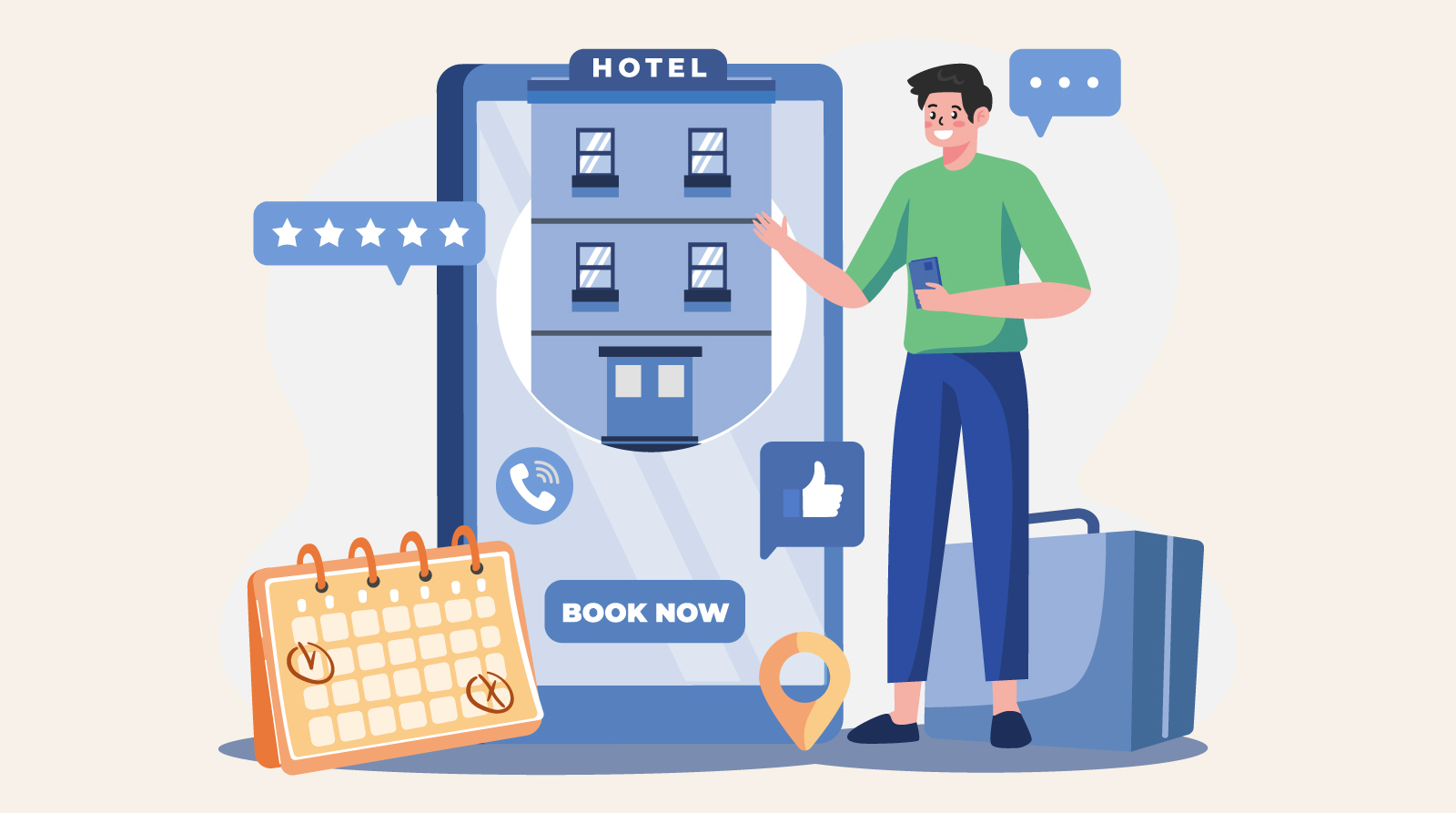Why Hotels Need Websites: A Must-Have, Not a Maybe

Studies show that hotels with optimized websites see a big boost in direct bookings.
If you’re still relying on third-party hotel booking sites, it might be time for a change.
The key to standing out is having a powerful hospitality website builder paired with an effective tourism SEO strategy.
This combination doesn’t just help you show up in search results—it makes your hotel irresistible to potential guests.
In this guide, I’ll walk you through the steps to create a website that not only attracts visitors but turns them into bookings. 
Why Should Your Hotel Have Its Website?
1. Your Website Reflects Your Brand
Many hoteliers struggle to boost their revenue because they don’t have a clear strategy.
The truth is, 50–70% of all hotel website visitors and bookings come from search engines.
If you’re not optimizing your site with a solid hospitality website builder and using tourism SEO effectively, you’re missing out on big opportunities.
Guests today do a lot of research online before they book, and figuring out how to reach the right people can feel overwhelming.
Relying only on hotel booking sites means you’re sharing the spotlight with other properties and paying a pretty hefty commission for the privilege.
Instead, it’s smart to take a balanced approach: Keep your presence on OTAs (like TripAdvisor) to maintain your reputation, but focus on driving direct, more profitable traffic to your website.
When you have a site built with a hospitality website builder and a booking engine, you get complete control over your brand, your pricing, and your margins.
By selling rooms directly on your website, you save money on commissions and can capture guest data to boost loyalty and future bookings.
It’s also important to stay proactive with your strategy—don’t just set it and forget it.
Search engines and guest behavior are always changing, so keeping your website up to date will help you stay ahead of competitors who might have a basic, outdated landing page.
Pro Tip: Try doing a quick SEO audit every few months and update your website content based on seasonal trends or local events. This keeps you ahead of the game and visible to potential guests.
2. Drive More Profit with Direct Bookings
Your website is like your secret door that lets you keep all the treasure, while hotel booking sites are like busy marketplaces taking a hefty toll each time someone walks through.
Every time a guest clicks “book” on an OTA, a slice of your hard‑earned revenue slips away.
But with a stunning standalone site built on a top‑notch hospitality website builder, you can roll out the red carpet and invite travelers in directly.
Picture this: A mobile‑friendly landing page showcasing your coziest suites, special weekend getaway bundles, or a “book today, save today” flash discount.
That kind of VIP treatment isn’t possible on a crowded OTA, but it’s a breeze when you control the entire booking journey.
Not only do you dodge commission fees, you also capture guest insights—think birthdays, loyalty preferences, or favorite room types—to tailor future offers.
Plus, by weaving in smart tourism SEO, like local event guides or insider tips, you’ll climb higher in search results, drawing in curious explorers who want an authentic stay.
More direct bookings mean fatter margins and a deeper connection with each guest.
Pro Tip: Entice direct bookers with an exclusive treat—maybe a complimentary sunset cocktail or late checkout—so they know they’re getting the VIP experience they won’t find anywhere else.
3. Expand Your Business Potential
Business travel isn’t just bouncing back—it’s booming.
After the pandemic slowdown, companies are sending employees on the road again in droves.
This year, global business travel spending is set to hit $1.48 trillion, and it could top $2 trillion by 2028; here in the U.S., it’s already climbed 6.2% to $310.2 billion.
Those aren’t just big numbers—they’re your ticket to a fast‑growing market.
Best of all, this surge shows no signs of stopping.
As the economy steadies and meetings fill calendars, business travelers will keep hunting for convenient, well‑equipped hotels.
If your website is both search‑friendly and a breeze to use, you’ll stand out from the crowd.
4. Turn Social Media into Guest Referrals
Social media is your secret referral engine.
When you post a striking shot of your lobby or share a fun peek behind the scenes at breakfast, you’re talking directly to past, current, and future guests.
That kind of real-life glimpse builds trust, and once someone’s stayed with you, they’re more likely to book again on your site instead of a crowded hotel booking site.
Here’s the thing: 92% of people trust recommendations from friends and family on social media more than any other ads.
So when a happy guest tags you or leaves a glowing comment, their entire network takes notice.
Keeping your feeds fresh and engaging turns each vacation snap into a potential referral.
Managing social media isn’t just about pretty pictures—it’s about staying top of mind.
Reply to comments, reshare user posts, or run a simple giveaway to keep the conversation going.
Every time you engage, you remind guests how much they loved their stay and make it easy for them to recommend you to their friends.
And don’t let that social buzz die on its own—bring it back to your website.
With a hospitality website builder, you can embed social feeds or review widgets right on your homepage.
That not only gives visitors a live taste of your guest experience but also boosts your tourism SEO by feeding search engines fresh content. 
5. Customer Reviews That Build Trust
These days, your online reputation is everything, and it starts with your reviews.
Before a guest even clicks “Book Now,” they’ve already scoped out your ratings, read a few reviews, and maybe even checked if you replied to feedback.
It’s human nature: We trust what others have experienced, especially when we’re booking a stay away from home.
But here’s the kicker—just having reviews isn’t enough.
To build trust and boost visibility, your hotel needs to show up in all the right places.
That means claiming and optimizing your local listings on platforms like Google Places, Bing, and TripAdvisor.
Why?
Because search engines are smarter than ever.
They don’t just show the best hotels—they show the best-reviewed, most relevant ones nearby.
That’s how someone searching “business-friendly hotel near me” ends up on your page instead of someone else’s.
When you claim those local profiles and keep them updated, you’re telling search engines, “Hey, we’re active, we’re trusted, and we’re worth showing off.”
Combine that with glowing guest reviews, and you’ve got a recipe for more bookings and more trust.
What Makes a Hotel Website Truly Effective?
1. Clean and Intuitive Design
Let me tell you, I can’t stand a messy hotel website.
You know the ones—too many pop-ups, menus that are all over the place, and photos that look like they were taken with a flip phone.
It’s not just annoying—it makes people leave before they even check the rooms.
That’s why a clean and easy-to-use design isn’t just nice to have, it’s a must.
When someone lands on your homepage, they should get the vibe of your hotel right away.
What’s it like? How do they book? What’s special about it?
If your website loads fast, looks good, and is simple to navigate, you’re already winning.
It’s like greeting your guests with a smile at the front desk—only online.
But if the site’s slow or confusing?
Most people won’t stick around.
They’ll head to another hotel that made things easier.
That’s why a user-friendly site does more than look pretty—it guides guests straight to that “Book Now” button without making them think too hard.
2. Essential User Interface Features
Let’s be real—people aren’t just browsing hotel websites from a desktop anymore.
Most of the time, they’re scrolling through options on their phones or tablets, maybe while waiting for their coffee or killing time at the airport.
That’s why having a mobile-friendly, responsive design isn’t optional—it’s essential.
If your site doesn’t adjust smoothly to different screen sizes or takes forever to load, users will bounce before they even see your beautiful rooms.
Speaking of beautiful, let’s talk photos.
First impressions matter, and high-quality images of your property can make all the difference.
Great photography isn’t just about showing off—it helps people feel what it’s like to stay at your hotel.
And once they can imagine that experience?
Booking becomes a no-brainer.
But it’s not just about making things look good—it’s about building trust too.
When visitors see real, well-shot images of your property, they feel more confident.
It shows you care about transparency and professionalism, which makes them more likely to choose you over a hotel with vague or outdated pictures.
Finally, let’s not forget speed.
If your site takes forever to load, people will get impatient and leave, no matter how nice your hotel is.
Fast-loading pages keep guests engaged, happy, and moving smoothly toward that all-important booking.
3. Tools That Boost Conversions
Your hotel website is like a digital concierge—welcoming, helpful, and always ready to seal the deal.
But here’s the twist: The real magic happens behind the scenes, with tools built not just to impress, but to convert.
Let’s start with the booking engine.
This isn’t just a feature—it’s your website’s secret weapon.
Instead of nudging guests toward third-party hotel booking sites that take a bite out of your revenue, you’re handing them the keys right there on your homepage.
Smooth, secure, and built for speed, an integrated booking engine makes the whole experience feel effortless.
One moment they’re admiring your sunset-view rooms, the next they’ve booked their weekend escape—no middleman, no friction.
Now, here’s where it gets clever: lead magnets.
They sound technical, but really, they’re just thoughtful digital freebies.
Picture this—someone lands on your site, curious but not quite ready to commit.
Then boom: you offer them a free insider’s guide to the city.
Maybe it’s the top five rooftop cafés or a three-day business travel itinerary.
In exchange, they drop their email.
That simple trade turns a passerby into a connection and opens the door to friendly follow-ups, seasonal offers, or personalized packages.
4. Consistent Branding Elements
Of course, first impressions matter, but it’s the lasting impressions that turn visitors into loyal guests.
And that’s exactly where consistent branding steps in.
Imagine landing on a hotel website that just gets you.
The colors, the tone, the vibe—it all feels cohesive, like you're already stepping into the lobby.
That’s no accident.
From your logo and website design to your messaging and voice, every piece should feel like part of the same story.
When people feel that consistency, they start to trust you.
And trust?
That’s what makes people hit “Book Now.”
But we’re not stopping there.
Want to build credibility?
Let your happy guests do the talking.
Showcasing customer testimonials on your site is like inviting future guests to hear real stories from real people.
When someone sees that others had a great experience, it makes the decision easier, because it’s no longer just your promise, it’s proof.
Another great way to show you know your stuff?
Start a blog.
Share tips on local attractions, secret spots in the city, or even packing hacks for weekend travelers.
Not only are you offering value (which builds trust), but you’re also boosting your SEO, bringing in more traffic from people who are searching for exactly what you’re offering.
You can also keep a dedicated page for news, updates, and events.
Think of it as your hotel’s bulletin board—whether it’s announcing a renovation, a seasonal discount, or a food festival happening nearby.
It keeps guests in the loop and shows that your brand is active, engaged, and always evolving.
And here’s a little bonus: when you highlight nearby attractions—whether it’s the best gelato in town or a hidden historical site—you’re giving your guests a more personal experience.
It shows that you care about their trip, not just their booking.
5. Reliable Backend Support
Behind the scenes, there’s a powerhouse making everything run smoothly—your website’s backend.
Think of it like the unsung hero of your hotel’s online success.
It’s responsible for keeping everything in place and ensuring visitors have a seamless experience, even when they don’t realize how much work is going on behind the curtain.
For starters, SEO acts as your backstage director, making sure search engines know exactly how to find you.
By using the right keywords, meta tags, and structured data, you’re not just throwing words into the wind.
You’re making your hotel more visible, pushing it to the front of search results, and helping potential guests discover your property in a crowded online world.
Then, there’s Google Analytics—your backstage detective, gathering data on how users interact with your site.
How long do they stay? Where do they click? Where do they drop off?
All this info is gold because it helps you understand your guests' behavior and refine your site to better meet their needs.
With a few adjustments here and there, like optimizing landing pages or adding a clearer call to action, you can turn casual visitors into booking guests.
And of course, there’s the security team—HTTPS, SSL certificates, secure web hosting, and regular backups.
These measures keep your guests' personal information safe and secure, building trust.
A secure website isn’t just a necessity; it’s a promise that guests’ data will stay protected as they book their stay.
Plus, search engines like Google reward secure sites, boosting your ranking and visibility.
FAQs
What Are Hotel Websites?
Hotel websites are dedicated online platforms where properties showcase rooms, amenities, and special offers. They serve as the primary digital storefront for guests to learn about the hotel and make direct bookings.
Why Is It Important for a Hospitality Business to Have an Online Presence?
Having an online presence ensures potential guests can discover and research your hotel anytime, anywhere. It builds credibility, boosts SEO, and drives both organic traffic and direct bookings in a competitive market.
What Advantages Can I Get if I Book Directly From the Hotel Website?
Booking directly often unlocks lower rates, exclusive packages, and no third‑party commission fees. You also enjoy personalized service, loyalty perks, and access to the best room choices and cancellation terms.
Do Hotels Care What Websites You Visit?
Hotels mainly track which referral sites drive traffic and bookings through analytics, not your individual browsing history. They use this data to improve marketing and partnerships, but generally don’t inspect your web activity beyond booking sources.
Final Thoughts
As promised, we’ve covered how a solid hospitality website builder and targeted tourism SEO can elevate your hotel’s online presence, drive direct bookings, and turn your website into a valuable business asset.
The key takeaway: Invest in the right tools, optimize your site, and make it as easy as possible for guests to book directly with you.
Don’t let third-party booking sites eat into your revenue.
Ready to take your hotel’s website to the next level?
Reach out today, and let’s get started on creating a site that truly works for you.







